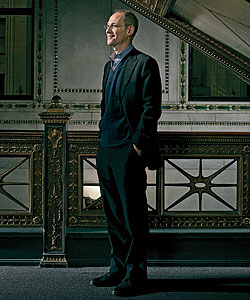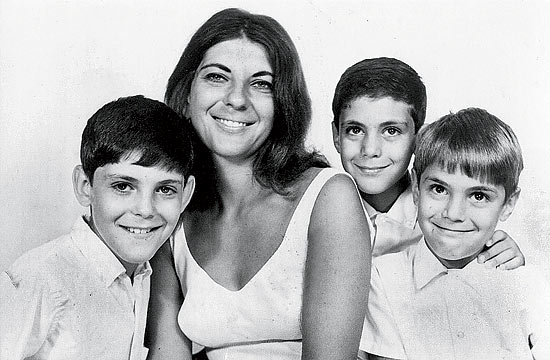Interview by David Bernstein

Photograph: Jeff Sciortino
Rahm’s big brother at a childhood haunt: the Chicago Cultural Center
When you first approached your family with the idea of writing Brothers Emanuel (published by Random House on March 26), what did they say?
My [three adult] daughters—they only see the downsides: “Oh, it’s gonna be public.” What they didn’t also see was [that] there was at least one other book proposal floating around to do a biography of us, unauthorized. So that was going to be done sooner or later. Better that we control it and get the story out as we remember it. Whatever anyone else does is going to be not as accurate.
You’re an oncologist, a bioethicist, and a national expert on health care policy. Was it tough for you to put your family on the couch?
No. We needed to be on the couch for many years. I mean, I just turned 55. [Rahm Emanuel, the mayor of Chicago, is 53; Ari Emanuel, a Hollywood agent on whom Jeremy Piven’s Entourage character is based, is 52.] You want to understand better what you are passing on to your kids. You want to understand better where you came from.
What was difficult—and actually I had to bring in [the author] Michael D’Antonio for parts of it—was the interviews. He interviewed my parents [Benjamin and Marsha Emanuel, a retired pediatrician and social worker, respectively, who live in Wilmette]. He interviewed friends. I think that was absolutely essential, in the sense that people aren’t necessarily going to tell me the truth. When I first introduced him to my parents, he began interviewing them, and I literally had to leave the room. I went downstairs into the basement.
How did you decide what couldn’t go in the book?
There was a sort of agreement between Rahm, Ari, and me. Interestingly, [there was] unanimity—complete, total unanimity. It’s only about three or four things [that we wanted to keep out of the book], and it was shocking to me, actually, that we would all agree.
Brothers Emanuel doesn’t mention your sister, Shoshanna, whom your parents adopted when you were a teen. Why?
Yeah, look, it’s about our growing up. She came much later. She needs her privacy. We’re not going there. It’s about the brothers.
The first sentence in the book is, simply, “Rahm.” What’s your relationship like with your younger brother?
Now we have a great relationship. We talk four or five times a week. He gives me advice. I give him advice. He takes it less often than I take it.
Has Rahm read your book?
No! He lived it, as he likes to say.
What’s your relationship like with Ari?
It’s very much the same [as with Rahm]. The level of closeness that we have as brothers seems so natural to me. I just couldn’t imagine living without talking to them every few days. I did not realize how unusual that was until really late in life.
The Daily Beast once described your family as the “Jewish Kennedys”—
Aaachhh, bullshit.
In that article, your father was quoted as saying, “We are better than the Kennedys.”
That’s my dad being sarcastic.
Who do you think is the most successful brother?
Ari’s the most powerful Hollywood agent. Rahm’s this critically important political figure. I’m a podunk academic.
You write that it “seemed almost predetermined” that you’d become a doctor like your father and that your brothers owe you for shouldering that expectation.
Absolutely. That’s undeniable. They owe me bigtime.
If you had another crack at your life up to now, would you do anything differently?
I’ve thought a lot about that question. I’ve had a wonderful career, in terms of being able to do what I want to do, influence things that I think are important, have a platform to advance ideas and proposals, mentor students. I might have been a complete flop if I had gone a different way.
What are you working on now?
I’m going to start writing a book on the American health care system and [its] future.
If you were stuck on a desert island with only one brother, who would it be? Rahm or Ari?
[Laughs.] Depends on the problems of the desert island. Is it a lack of entertainment, or is it a lack of transportation and good schools?
OK, the three of you are on a desert island. Who’s the last one standing?
Depends on whether we’re suffering from illness or not.
* * *
The Family Recipe
What’s the secret to raising a brood of high achievers? Here’s how Ezekiel Emanuel’s parents did it.

Photograph: Courtesy of Ezekiel Emanuel
From left: Zeke, Marsha, Rahm, and Ari Emanuel in the summer of 1967
Give the kids heavy doses of art, music, and theatre. The Emanuel boys frequently attended concerts at the Old Town School of Folk Music and Symphony Center.
Encourage them to explore the city. The siblings visited used bookstores in Uptown and spent summers at Foster Beach, where they experienced discrimination.
Take them to hear important people speak. The Emanuels went to see Martin Luther King Jr., among others.
Push them to get part-time jobs. As teens, Zeke worked as a pizza delivery boy, Rahm at Arby’s, and Ari at the Chicago Mercantile Exchange.
Hold mandatory family sound-offs. At the Emanuels’ kitchen table, no topic was off-limits.
Expose them to other cultures. The family often vacationed in Israel.


